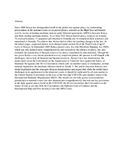| dc.description.abstract | Since 2008 Kenya has distinguished itself in the global war against piracy by undertaking prosecutions in the national courts of suspected pirates, arrested on the High Seas and handed over by navies of leading maritime nations under bilateral agreements (MOUs) between Kenya and these leading maritime nations. As of June 2013 Kenya had 64 piracy suspects on remand, 74 convicted pirates, 17 acquitted and returned to Somalia and 10 completed their sentences and repatriated to Somalia. To achieve this, Kenya had to effect far reaching changes in the law. In the initial stages, suspected pirates were charged under section 69 of the Penal Code (Cap 63 Laws of Kenya). In September 2009 Kenya passed a new law (the Merchant Shipping Act 2009), which not only defined more comprehensively and extensively the offence of piracy, but also extended the jurisdiction of Kenyan courts to try piracy committed by non-nationals. Though the law gives Kenya a very broad jurisdiction to try suspected pirates, the process is still fraught with challenges, due to lack of financial and human resources. Kenya's new law domesticates the model spelt out in the Convention on the Suppression of Unlawful Acts against the Safety of Maritime Navigation (the SUA Convention) which calls on member states to criminalise, in their national legislation, the maritime offences listed in Article 3. The article discusses Kenya's new model legislation and the emergent Kenyan jurisprudence and argues that while the model faces challenges in its application by the domestic courts, it should be replicated by all state parties to the United Nations Convention on the Law of the Sea (the UNCLOS) and member states of the International Maritime Organization (IMO). The model law not only grants extra-territorial jurisdiction to national courts, but also domesticates comprehensively the relevant key provisions in the fight against piracy found in the UNCLOS, the SUA Convention, the Convention on the Safety of Life at sea (the SOLAS Convention,) the Djibouti Code of Conduct and the International Ship and Port Security Code (the ISPS Code). | en_US |

